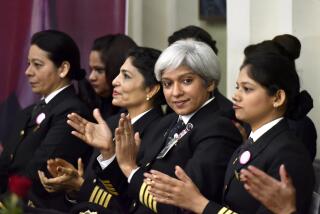ON THE JOB : TRENA MARKUS : Aerospace Engineer
- Share via
Fresh with a master’s degree in mechanical engineering from Michigan State University, 25-year-old Trena Markus took a job last June at Douglas Aircraft Co. in Long Beach, where she works on development of the C-17, a cargo jet for the U.S. Air Force. Markus spends long hours scratching out designs with a pad and pencil, but she enjoys the headwork. She is especially excited about the C-17, a new breed of aircraft, because it presents some special design problems. It needs to be big and strong enough to carry tanks, yet it must be nimble so that it can land on the short runways of jungle military bases. The following was taken from an interview with Markus by Denise Gellene, a Times staff writer.
We have a popular saying around here: “Get it light the first time.” The heavier the aircraft, the less maneuverable it is and the more runway space it needs. So, it’s important for us to keep its weight down. It’s our biggest challenge.
I’m a stress engineer. My job is to pick apart the aircraft and decide if it is strong and light enough. I work on the center fuselage--if you were to cut off the nose of the airplane and the tail, the fuselage is the part you have left.
I use a computer to pressurize the entire aircraft and send it through (simulated) maneuvers, like a dive or a roll. I watch to see how the maneuvers affect each little part. I concentrate on just one section at a time. I cut the fuselage into tiny sections, about nine inches long and six inches deep.
Some of the things we test for around here would surprise you. I remember the first time I heard about testing for bird strikes and thinking, “That’s really crazy.” But I learned that it’s really crucial. We have to make sure an engine can ingest a lot of birds and still not be destroyed.
To be a good engineer you need to be an analytical person. A lot of my job is spent alone at a desk. You have to like picking apart a problem.
I like to figure things out on paper. I always did. I was always really good at math in school. My dad enjoyed math--he was a chemist--and we used to always sit and do math problems together. He used to do my homework with me and then he used to say: “That was fun. Let’s do some more problems.” And we did. I thought, “I like math. Maybe I should stick with it.”
I didn’t consider engineering until I got to college. I was a typical girl. I didn’t take apart cars. I don’t have a lot of mechanical experience, and that’s a personal shortcoming. My co-workers who do can envision things a little more quickly than I can.
I’m the type of person who always asks why . I think a good engineer constantly asks why.
A lot of times the work can be repetitive. You’re doing several parts that are alike, and it can get monotonous. But it’s important to keep asking questions : “Is this going to be good enough? Is there something we’re overlooking?”
I have a big responsibility. Lives count on my work. I think about that every day. To be a good engineer, you have to step back and remember what it is you’re working on in terms of the big picture.
We’re breaking new ground here. The type of payload the C-17 is carrying exceeds what other airplanes are capable of carrying. No one has built any-
thing quite like it yet. We have to figure out how we’re going to make it work. That’s exciting.
I’m one of three women engineers out of about 150 engineers in my section. People will think that it’s difficult to be a woman in a male environment, but it’s not. I find that the men treat me the same as they treat their other co-workers.
I didn’t expect that. I expected to have somewhat less credibility. I thought if I said that a calculation wasn’t right, they wouldn’t accept my judgment. But it’s not that way at all.
A woman engineer in this field has to walk in with an open mind. You can’t have a chip on your shoulder. If you anticipate difficulties, I think you’ll find them.
I like engineering for a couple of reasons. I like the problem-solving aspect. I like the rap sessions I have with my colleagues to solve design problems. I feel I should be more profound than that, but that’s about it.
The gratification comes when the plane takes its first flight. That’s a long way down the road, so you do have to find some gratification elsewhere. I helped design a doorstop. It’s a part that keeps the door from opening when pressure builds inside a plane. When we got finished and tested it and saw that it worked, it felt really good.
More to Read
Inside the business of entertainment
The Wide Shot brings you news, analysis and insights on everything from streaming wars to production — and what it all means for the future.
You may occasionally receive promotional content from the Los Angeles Times.










